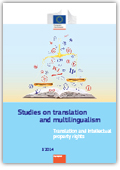Translation and intellectual property rights is a brochure/PDF prepared for the EU by Bird and Bird LLP. It is only available in English (a bit Franglish).
The brochure considers the law in the EU and in a number of countries (Belgium, France, Germany and the UK). It considers it both from an upstream point of view (is the original text subject to copyright?) and a downstream one (is the translation subject to copyright?).
Whether one’s translation might be copyright is one of those topics that translators’ mailing lists get heated about every year or so.
Copyright usually attaches to literary and artistic works. But what about other types? For example, are statutes copyrighted? One hopes not. They should be freely distributed. Thus it’s interesting that the EU does not exclude EU publications from copyright, but at the same time the Commission’s policy is to increase their use:
In this respect, the status of European Union publications is not very clearly regulated. On the one hand, there is no legal provision at the European Union level, as it is the case under national laws, which stipulates that legal texts such as Regulations or Directives fall within a category of works are deprived of copyright protection. The “Legal notices and copyright” contained within the “Information Provider’s Guide”40 and the section related to copyright in the Interinstitutionnal style guide”41 (these two documents emanate from the European Union institutions) both tend to go in the opposite direction: they provide for that the European Union owns a copyright on all official publications of the Union institutions or bodies. It does therefore not seem that the official texts of the European Union are legally excluded from copyright protection. That being said, the reuse policy of the European Commission42 aims at increasing the use and the spread of the European Union information, also to foster innovation. Hence we believe that the official texts of the European Union fall under that policy and should be easily and freely reused despite their possible copyright protection, in accordance with the provisions laid down under Decision 2011/833/EU, hence, among other things, under reservation of the
exclusive rights of third parties.
There is a comparison of how the four countries treat works created by an employee in the course of employment.
Exceptions to copyright, e.g. for educational use, are discussed, and this is also related to the problem of machine-aided translation (where your database might contain elements from copyright works). The law as it stands would appear not to protect machine (-aided) translation, and the authors would welcome ‘full compulsory harmonization’.
Another aspect considered is how various legal systems treat translations carried out without the original author’s consent.
I was particularly interested in the protection of official translations of official texts.
It derives from the situation created by the Berne Convention that a distinction must be made in most Member States between the following three types of works: (i) official texts/acts; (ii) official translations of official texts/acts; and (iii) non-official translations of official texts/acts. For the first two categories the regime is rather straightforward: no copyright protection. …The situation is more complex with respect to non-official translations of official texts/acts. Scholars consider that the wording of article 2(4) in fine indicates a contrario that a contracting party of the Berne Convention “cannot deny protection to non-official translations of these texts – presumably translations made by private publishers”.
(Is in fine a French Latinism for the German am Ende? haven’t seen it in English before).
There is more, of course, including information on database rights and recommendations for contracts with translators – I have just skimmed the 146 pages. There’s a bibliography and case references too. Recommended.


Yes. It (in fine) is a French Latinism and frequently occurs in French-language pleadings (statements of case). Out of curiosity, I sometimes leave the English translation with the Latin if I know the end-users are the UK/Irish/US legal profession, courts or probate etc. registries So far, there have been no queries.
Coincidentally, I recall Professor Heikki E.S. Mattila of the University of Lapland delivering a magnificent paper in perfect English about legal Latin at the FIT (International Translators’ Federation) Congress in (FI) Tampere/ (SV)Tammerfors, Finland, in 2005.
He has written extensively about the subject and agreed with me that some Latin expressions just do not travel. I was intrigued, though, that this topic had travelled to the northernmost part of Scandinavia as well as why and how it impacted on Finnish lawyers’ professional practice.
I suppose cynics would like to start switiching to ‘in fine dies’ from the hackneyed expression of ‘at the end of the day’ or, as has started surfacing in German-speaking countries over the last 10 years or so, ‘am Ende des Tags’.
Pingback: Translators and copyright | Veille juridique
I usually see ‘a.E.’ in German legal footnotes.